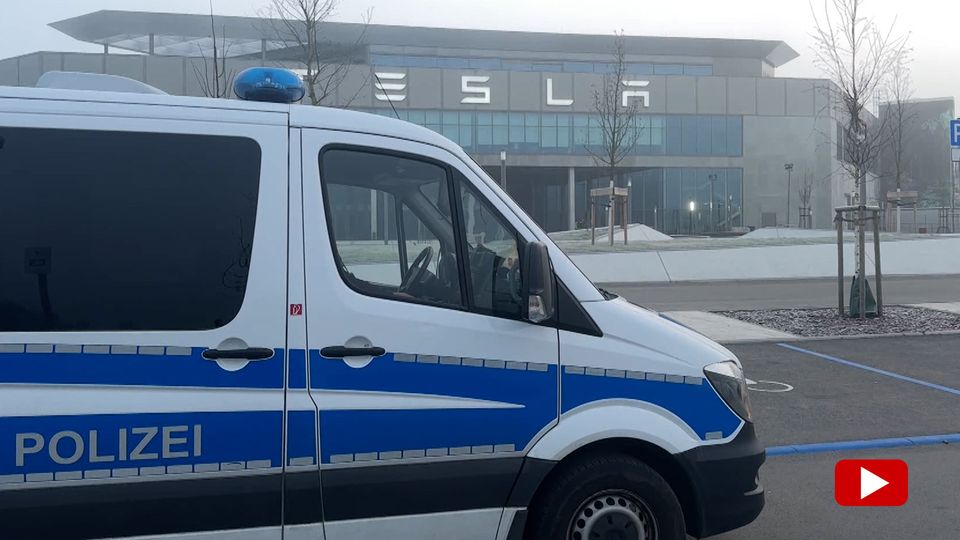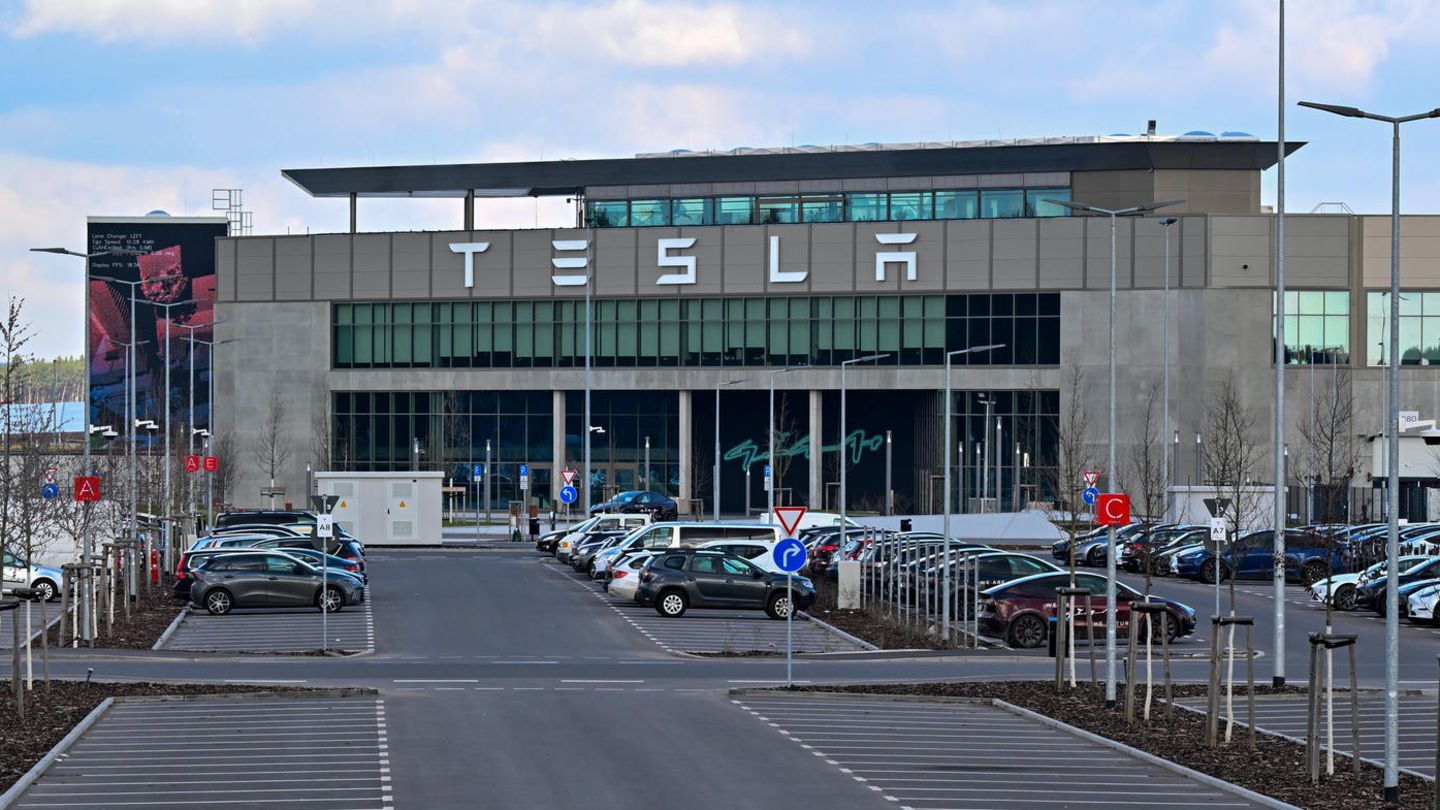The attack on the power supply is affecting Tesla even more than previously thought. Politics and business are alarmed.
After the attack on the power supply, production at the US electric car manufacturer Tesla in Grünheide will remain interrupted until the end of next week. The company announced this on Wednesday evening upon request. The “Bild” newspaper had previously reported on it. On Tuesday, previously unknown perpetrators set fire to a power pole in a field that is also responsible for supplying the Tesla factory. Production in Grünheide near Berlin was then stopped. Tens of thousands of residents in the region were also affected by the power outage.
With the forced longer production stop at Tesla’s only car factory in Europe, the damage to the company is likely to increase. Tesla recently cited hundreds of millions of euros as damage. But it was still expected that production would restart next Monday. Now there would be another week of standstill.
The economy in Germany is pushing for more security after the attack on the electricity supply. “Politics and business are jointly required to ensure the security of networks and critical systems,” said Martin Wansleben, Managing Director of the German Chamber of Commerce and Industry (DIHK). The federal government wants to use a law to strengthen the protection of important networks and systems and support the security efforts of operators. Wansleben criticized that the government had been delaying the adoption of the relevant law for months.
Unknown perpetrators set fire to an electricity pylon in a field on Tuesday, which is also responsible for supplying the Tesla factory. The police described a letter of responsibility from the left-wing extremist “” as authentic. The energy network operator Edis announced that the emergency services were working hard to supply the Tesla factory and a logistics center with electricity again.
The law is due to go to the cabinet in the first half of the year
Government spokesman Steffen Hebestreit said on Wednesday that the federal government condemns such attacks in the strongest possible terms. The Federal Ministry of the Interior plans for the cabinet to deal with the so-called Kritis umbrella law in the first half of the year. This is intended to better protect the critical infrastructure against dangers. In addition, it is the obligation of the network operators to protect their infrastructure, said the spokesman for the Federal Ministry of the Interior, Maximilian Kall. This is of course easier with a substation than with a power pole standing in a field.
The Federal Association of Energy and Water Industries suggested that the federal and state governments be made more responsible for averting danger. Public access to critical infrastructure data must be restricted.
Not the first attack on Tesla
The left-wing extremist “Vulkan Group” accuses Tesla of “extreme conditions of exploitation”. The group wrote of sabotage against Tesla. “We consider the letter to be genuine,” said a spokeswoman for the Brandenburg police. Even if the consequences are much more serious this time, the attack follows the same pattern as the arson attack in May 2021, in which a power cable that, among other things, supplied the Tesla construction site was damaged. At that time too, a letter of self-incrimination appeared in the name of the “volcano group” and was deemed authentic by the security authorities.
The perpetrators could not be identified at the time. That’s why the security authorities make do with the working hypothesis that these are rather loosely networked small left-wing extremist groups with a focus on Berlin and Brandenburg.
What is certain is that in recent years, US companies in particular that wanted to settle in the Berlin-Brandenburg region were not always welcome – even beyond attacks and sabotage. In Brandenburg, among others, environmentalists, residents who felt disturbed and the AfD mobilized against Tesla’s Gigafactory. The US internet company Google acquired a former substation in the Kreuzberg district of Berlin and announced at the end of 2016 that it would establish a campus for young companies and other organizations there. Critics protested because, in their view, the campus would have significantly changed the area and made it more expensive. Ultimately, Google gave up the start-up campus. When asked by a journalist whether the federal government feared negative consequences for Germany as a business location, the government spokesman replied: “I would now warn against alarmism.”
Minister: Elon Musk reacts matter-of-factly
Tesla boss Elon Musk was reportedly calm, even though the factory in Germany is currently shut down. Economics Minister Jörg Steinbach (SPD) spoke to him on the phone on Tuesday. “Elon Musk was very matter-of-fact and confident in his reaction,” said Steinbach to the “Tagesspiegel” (Wednesday/online). “There was immediate agreement that nothing should happen in response that would have allowed the attackers to succeed.” However, Musk called for solidarity and confidence-building measures to support the company and its employees.
Resistance against the car manufacturer is increasing. In a citizen survey in Grünheide, around two thirds rejected Tesla’s planned expansion to include a freight station and warehouse on an adjacent site. More than 100 hectares of forest are to be cleared there. On Thursday, environmentalists and Tesla critics set up a protest camp with tree houses near the factory in the forest ().

Plant manager André Thierig is concerned. With regard to the attack, he sees a “very critical underlying mood that may also fuel such behavior to a certain extent.” According to information from the German Press Agency, Thierig is referring to the previously mentioned damage of several hundred million euros to the loss of sales of the cars that are not sold. He expects more than 1,000 cars to be down every day.
Industry expert sees damage to image
There’s a lot at stake: around 12,500 people work at Tesla in Grünheide. The car manufacturer is planning to expand the existing plant. The planned production of 500,000 cars per year is expected to increase to one million. Thierig leaves it open whether the plans will last. “I can’t say at this point whether this will have an impact on the further expansion of the factory.”
Industry expert Stefan Bratzel sees a certain danger for production in the German automotive industry after the attack. In addition to the power supply, there are other ways to disrupt production, said the head of the Center of Automotive Management (CAM) in Bergisch Gladbach.
Note: This text has been supplemented with further information.
Source: Stern




